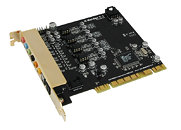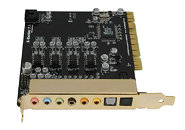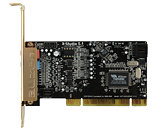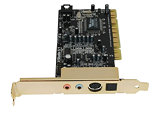Thursday, July 9th 2009

Auzentech Launches X-Raider and X-Studio Sound Cards
Auzentech announced today the immediately availability of the Auzen X-Raider 7.1 and X-Studio 5.1 sound cards. These sound cards provide an affordable upgrade from the onboard audio built into desktop PCs, and are ideal for improving audio from games, music, and movies. The Auzen X-Raider 7.1 is a PCI sound card with swappable OPAMPs for all channels, SPDIF(Optical) In/Out, internal digital output via two-pin connector, support for HD front panel audio, Magic Voice, Microphone Echo, key-shifting, Xear3D, EAX 1.0/2.0, A3D and DirectSound. The X-Studio 5.1 is a low profile PCI Sound Card with a swappable front-left and front-right channel OPAMP, internal digital output via a two-pin connector, support for QSound Labs 3D Surround Engine driver, and HD front panel audio. Both sound cards are compatible with Intel and AMD processors and Windows XP or Vista.Related Links
Source:
Auzentech
- Auzen X-Raider 7.1 Sound Card product page
www.auzentech.com/site/products/x-raider.php - Auzen X-Studio 5.1 Sound Card product page
www.auzentech.com/site/products/x-studio.php




23 Comments on Auzentech Launches X-Raider and X-Studio Sound Cards
The XRaider looks like a good card though, built on the ever-present 8768 Chipset.
The XStudio is a VIA chipset, from the specs alone it looks in line with other sound chipsets, but we'll see how it does on release.
Anyhow, for those wondering, these cars (based on what I can make out from the images, Auzen's level of quality, and the DSP) will completely TRUMP any onboard solution (like 95% of all stand-alone adapter cards do) . . . and for the price they're asking, are worth their weight! :toast:
I also find it interesting how they call the other soundcard "studio" when it dosent have ASIO drivers? you need asio drivers when using any multimedia software (music production, video production etc...)
TBH, I'm quite surprised to see a VIA DSP utilized by Auzen . . . the X-Raider is packing a C-Media, though.
It's the same chipset that's used in Auzentech's previous X-Plosion and X-Plosion Cinema (8770 is the SAME THING) cards.
although, that probably would've driven the price of the card into the lower-mid range, instead of the economy range it's currently situated in . . .
The VIA, though, I'd be curious to hear - we don't see too many audio cards with VIA DSPs . . . and, sadly, VIA (nor Auzen) doesn't list too in-depth of specs for the Tremor chipset.
Either way, both are highly respectable cards for their price range . . . I'd defi recommend either of these over Creative's Extreme Audio any day. :toast:
The driver sets for the 8770, 8768 and 8738 are the SAME THING. Seriously. The 8768 can have DTS "seen" in the control panel, but it'll never work on an 8768 chip :(
Like - C-Media's 8787 doesn't support any Dolby capabilities . . .
. . . although it supports 32b playback :wtf:
Huh . . . I guess C-Media haven't updated their site, then . . .
Although, if you're running a Razer . . . it's quite possible that 8787 is a "special" DSP, much like ASUS' AV200 is . . .
that's quite interesting, though . . .
I had myself, and somebody else test the drivers to confirm that Dolby and DTS were fully working.
It's a very simple INF mod.
I'm not sure, TBH - there's a lot of "rebranding" and "specialty" DSPs in the audio chipset realm.
Unless you have crazy speakers and need some special type of connection I dont know if there is enough of a difference to justify spending the $$.
One thing I liked about my Asus D1 card is headphones were noticeably louder/clearer over the realtek 889A, maybe the experts here can say if the Auzen cards have a similar effect on headphones.
It would be nice to see a comparison between these and the Asus ones...
With that said, I got my hands on a rare made-for-Alienware edition of Creative Sound Blaster X-Fi Titanium the other day, with X-RAM and all that other voodoo, and I must say that there is still something that dedicated sound solutions can do better. While ALC889A is pretty good compared to previous onboard solutions, especially in regard to signal purity, X-Fi Titanium still offers better experience when it comes to music playback, gaming (semi-proper EAX support for what it's worth), and there is much more for those who are into content creation.
While the situation is not like it was 8-9 years ago when onboard sound with few exceptions was anywhere from terrible to barely tolerable, I would say that dedicated high-end sounds cards still have their place. For now at least.
I must say I loved the Asus D1 card I had (but PCI wouldnt fit any mobos I was choosing from so its gone) It was superior with the headphones... I may get a sound card (depending on how the onboard is) but I need the PCI X so it looks like its a choice between the Asus DX or the more expensive AuzenTech AZT-FORTE. Looks like this one (Auzen X-Studio) is just PCI.